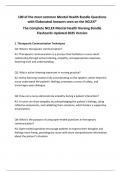100 of the most common Mental Health Bundle Questions
with Elaborated Answers seen on the NCLEX®
The Complete NCLEX Mental Health Nursing Bundle
Flashcards Updated 2025 Version
1. Therapeutic Communication Techniques
Q1: What is therapeutic communication?
A1: Therapeutic communication is a process that facilitates a nurse-client
relationship through active listening, empathy, and appropriate responses,
fostering trust and understanding.
Q2: Why is active listening important in nursing practice?
A2: Active listening involves fully concentrating on the speaker, which helps the
nurse understand the patient’s feelings, promotes a sense of safety, and
encourages open dialogue.
Q3: How can a nurse demonstrate empathy during a patient interaction?
A3: A nurse can show empathy by acknowledging the patient’s feelings, using
reflective statements, and validating their emotions, which fosters a supportive
environment.
Q4: What is the purpose of using open-ended questions in therapeutic
communication?
A4: Open-ended questions encourage patients to express their thoughts and
feelings more freely, providing the nurse with more comprehensive information
about the patient’s situation.
,Q5: Describe the role of silence in therapeutic communication.
A5: Silence can give patients time to think and process their emotions, allowing
them to articulate their feelings at their own pace, which can enhance
understanding.
Q6: How can a nurse effectively use summarization in therapeutic
communication?
A6: Summarization involves restating key points of the conversation, which helps
clarify information, reinforces understanding, and shows the patient they have
been heard.
Q7: What techniques can nurses use to establish rapport with patients?
A7: Techniques include introducing oneself warmly, maintaining appropriate eye
contact, using the patient’s name, and demonstrating genuine interest in the
patient’s concerns.
Q8: Why is nonverbal communication significant in nursing?
A8: Nonverbal communication, such as body language, facial expressions, and
tone of voice, can convey empathy, openness, and attentiveness, enhancing the
therapeutic relationship.
Q9: How should a nurse respond to a patient who expresses anger?
A9: The nurse should remain calm, listen actively, acknowledge the patient’s
feelings, and explore the reasons behind the anger to facilitate resolution.
Q10: What is the importance of setting boundaries in therapeutic
communication?
, A10: Setting boundaries helps maintain a professional relationship, prevents
dependency, and ensures that the focus remains on the patient’s needs.
2. Personality Disorders (Cluster A, B, C)
Q11: What are the main characteristics of Cluster A personality disorders?
A11: Cluster A personality disorders, including paranoid, schizoid, and schizotypal
personality disorders, are characterized by odd or eccentric behaviors and social
withdrawal.
Q12: Describe paranoid personality disorder.
A12: Paranoid personality disorder is characterized by pervasive distrust and
suspicion of others, often interpreting benign remarks as malicious.
Q13: What is the hallmark of schizoid personality disorder?
A13: Individuals with schizoid personality disorder show a lack of interest in social
relationships and a limited range of emotional expression.
Q14: Identify key traits of Cluster B personality disorders.
A14: Cluster B disorders, including antisocial, borderline, histrionic, and
narcissistic personality disorders, are marked by dramatic, emotional, or erratic
behaviors.
Q15: How is borderline personality disorder characterized?
A15: Borderline personality disorder is characterized by instability in mood, self-
image, and interpersonal relationships, often leading to impulsive actions.
Q16: Describe the main features of narcissistic personality disorder.





